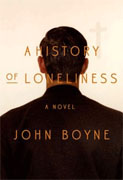A History of Loneliness
John Boyne
book reviews:
· general fiction
· chick lit/romance
· sci-fi/fantasy
· graphic novels
· nonfiction
· audio books
· author interviews
· children's books @
curledupkids.com
· DVD reviews @
curledupdvd.com
newsletter
win books
buy online
links
home
for authors
& publishers
for reviewers

 |
A History of Loneliness John Boyne Farrar, Straus and Giroux Hardcover 352 pages February 2015 |
|
A writer of exceptional insight, Boyne builds a damning case against an institution that has been riddled with generations of an insidious cancer of deceit and betrayal, a Church called upon to atone for its history of sins. Neither an apology nor an indictment, the power of this novel is its unsparing acknowledgment of guilt, as related by the voice of Odran Yates. He is a priest whose vocation spans the 1960s to the present, raised in the traditions of the Catholic Church in Ireland where religion dominates the lives of the faithful, “the fathers” called upon by families for moral guidance in matters spiritual and secular. Faith is a given, loyalty to the Church unquestioned.
Doyle builds the precise structure of religious life in the particular experiences of his protagonist, from childhood to seminary, including a troubled year spent in Rome (where personal failings and humiliation chisel away at Yates’ perception of himself), occasional meetings with Tom Cardle, with whom he has maintained a friendship of sorts, comfortable years spent at an established boy’s school, and finally an assignment in a North Dublin parish, where Yates has been instructed to assume Cardle’s place temporarily. As he segues between past and present, Odran reluctantly reveals long-held secrets in a recurring pattern where omissions are common, later clarified and woven into the larger picture. It is a telling habit, one begun as a child. And while the Church in Ireland is finally called upon to answer for the abuse of children by pedophile priests with the collusion of a hierarchy of superiors, Odran is not only confronted with the horrors done in the name of his Churchut suddenly aware of his own complicity through silence: “I had seen things. I had suspected things and I had turned away from things and I had done nothing.” This is perhaps the most stunning and damning element in an astonishing novel: the willful blindness of those saw but chose to look away, the perpetration of evil with the assumed consent of those who fail to act--priests like Yates, content to avoid controversy, ever empathetic to his fellow priests’ struggles: “I hate to think of a man alone, no matter what he has done.” And while Cardle bears the burden of guilt, a prototypical scapegoat in this particular example of sexual deviance abetted by those in service to an institution, it is Odran’s life that betrays the telltale cracks, his failures running deeper for the ability to make a difference, becoming increasingly horrifying with each new revelation. Odran never really appreciates the true nature of his “calling.” It is staggering to witness how far St. Peter’s Church has fallen, how corrupt it has become, infested with greed, vanity, ambition and perversion. Boyne has captured it all with bone-chilling accuracy and haunting truth. It’s time. Originally published on Curled Up With A Good Book at www.curledup.com. © Luan Gaines, 2015 |
| Also by John Boyne: |
|
|
|
 Click here to learn more about this month's sponsor! |
|
| fiction · sf/f · comic books · nonfiction · audio newsletter · free book contest · buy books online review index · links · · authors & publishers reviewers |
|
| site by ELBO Computing Resources, Inc. | |
 It is Odran’s nature to get along, to avoid making waves, retreating to convention or distraction when presented with difficult situations. The family of three children, with a beautiful mother and erratic father who pursues a life on the stage despite a paucity of talent, suffers a tragedy when Odran is young.
That reshapes the future and leads the eldest boy to acquiesce when his recently religiously devoted mother declares her son has a vocation. Despite a clumsy attempt at adolescent sexuality with a neighbor girl at twelve, Odran hasn’t strong inclinations toward the opposite sex in general, at least none that would cause undue concern.
He fits comfortably into the regimented routines of seminary life, the only hint of a world more unpredictable from his roommate in the seminary, Tom Cardle, a boy clearly in conflict with his intended role as a priest.
It is Odran’s nature to get along, to avoid making waves, retreating to convention or distraction when presented with difficult situations. The family of three children, with a beautiful mother and erratic father who pursues a life on the stage despite a paucity of talent, suffers a tragedy when Odran is young.
That reshapes the future and leads the eldest boy to acquiesce when his recently religiously devoted mother declares her son has a vocation. Despite a clumsy attempt at adolescent sexuality with a neighbor girl at twelve, Odran hasn’t strong inclinations toward the opposite sex in general, at least none that would cause undue concern.
He fits comfortably into the regimented routines of seminary life, the only hint of a world more unpredictable from his roommate in the seminary, Tom Cardle, a boy clearly in conflict with his intended role as a priest.